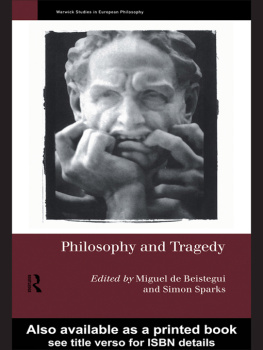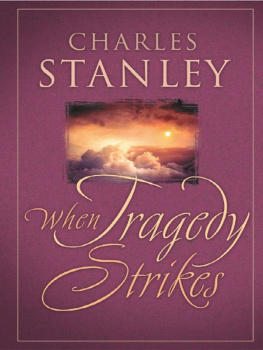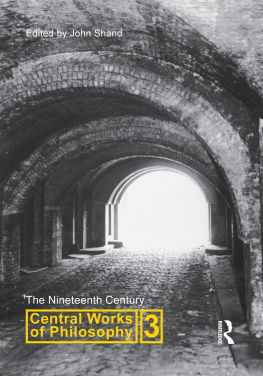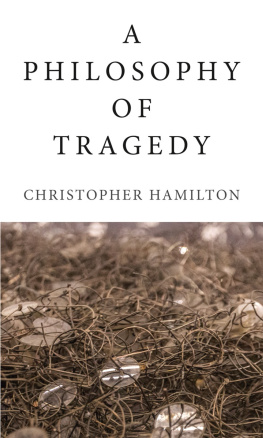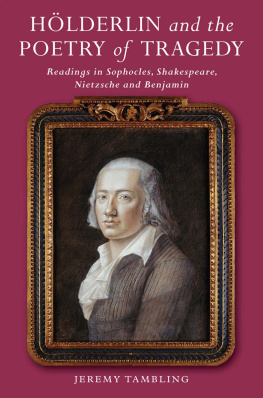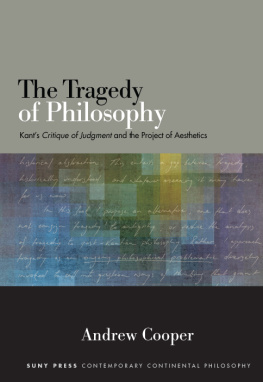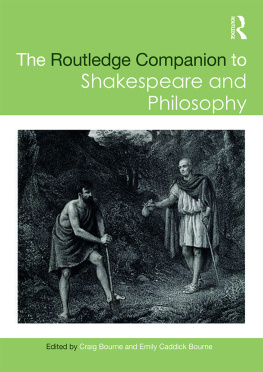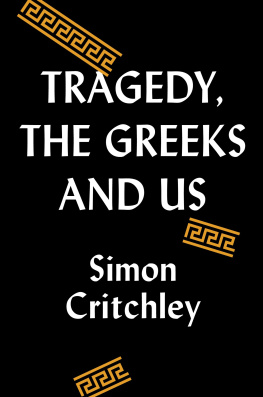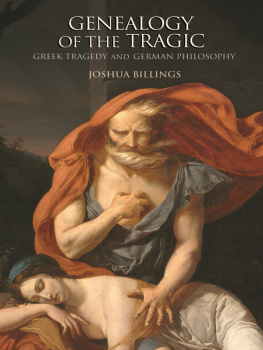Acknowledgements
The impetus for the essays collected in this volume was the conference On Tragedy held at the University of Warwick on 24 May 1995. The contributions from Miguel de Beistegui, Franoise Dastur and Philippe Lacoue-Labarthe are more or less modified versions of the papers delivered there. The volume was also to have included Marc Froment-Meurices Antigone: In (the) Place of Tragedy, included in his Cest--dire (Paris: Galile, 1996) and now available in translation as That Is to Say (Stanford: Stanford University Press, 1999). Versions of the essays by Jean-Franois Courtine and Walter Brogan first appeared in Extase de la raison: Essais sur Schelling (Paris: Galile, 1990) and Research in Phenomenology , volume xxiv (1994) respectively. We would like to thank Galile and the editors of Research in Phenomenology for generously granting permission to reprint these essays.
Our thanks also to Oxford University Press for permission to quote from G.W.F.Hegel Aesthetics: Lectures on the Fine Arts , trans T.M.Knox (1975).
We would like to thank Andrew Benjamin, who commissioned this volume, and Tony Bruce, our editor at Routledge. Our thanks, equally, to Jonathan Derbyshire, Anne OByrne, Peter Poellner and John Protevi for their translation work, and for so readily approving our changes. Lastly, we owe debts of gratitude to Warwick University for their fine hospitality, and to the participants of Warwick conference for their invaluable contributions.
List of contributors
Miguel de Beistegui is Lecturer in Philosophy at the University of Warwick. He has published essays on Heidegger in English and in French, and is author of Heidegger and the Political: Dystopias .
Walter Brogan is Professor of Philosophy at Villanova University. He is the author of several articles on Nietzsche and has published extensively in Ancient Greek Philosophy and Contemporary Continental Philosophy. He is the cotranslator of Heideggers Metaphysics 13: On the Essence and Actuality of Force , and is currently working on a book for SUNY Press on Heideggers interpretation of Aristotle.
Jean-Franois Courtine is Professor of Philosophy at the Universit de Paris (X), and the Director of the Husserl Archives in Paris. Translator of Schellings work into French, he has written extensively on German Idealism and phenomenology. His books include Heidegger et la phnomnologie and Extase de la raison: Essais sur Schelling .
Franoise Dastur is Professor of Philosophy at the Universit de Nice. One of the leading interpreters of Hlderlin in France, she is the author of Hlderlin, le retournement natal: Tragdie et modernit & nature et posie , as well as works on Heidegger, Husserl and the question of death. All her books are currently being translated into English.
Gnter Figal is Professor of Philosophy at the University of Tbingen. One of Germanys foremost interpreters of recent German thought, he has published extensively on Nietzsche.
Marc Froment-Meurice is a Professor in the Department of Romance Languages, Vanderbilt University, Nashville, USA.
Rodolphe Gasch is Professor of Comparative Literature at the State University of New York, Buffalo. His books include The Tain of the Mirror and Inventions of Difference .
David Farrell Krell is Professor of Philosophy at DePaul University, Chicago. He is the author of, amongst other works, Daimon Life: Heidegger and Life-Philosophy and Lunar Voices: Of Tragedy, Poetry, Fiction and Thought .
Philippe Lacoue-Labarthe is Professor of Philosophy at the Universit des Sciences Humaines de Strasbourg. Since the appearance of his first essays on and translations of Hlderlin in the 1970s, he has been one of the leading interpreters of Hlderlin in France. Amongst his most recent works are Musica ficta (figures de Wagner) and Metaphrasis . In English his publications include The Literary Absolute and Retreating the Political (both co-authored with Jean-Luc Nancy), Typography, Heidegger, Art and Politics and The Subject of Philosophy .
Will McNeill is Associate Professor of Philosophy at DePaul University, Chicago. He has translated or co-translated several Heidegger volumes, and is author of The Glance of the Eye: Heidegger, Aristotle, and the Ends of Theory .
Simon Sparks is a Leverhulme Trust Research Scholar at the Universit des Sciences Humaines de Strasbourg. He is the co-editor of On Jean-Luc Nancy and editor and co-translator of Philippe Lacoue-Labarthe and Jean-Luc Nancys Retreating the Political .
Introduction
Miguel de Beistegui and Simon Sparks
We take as our point of departure the following observation: apart from the texts of Greek philosophy which treat of tragedy, whether from the point of view of its political status (the Republic ), or from that of its form and effects (the Poetics ), there actually exists another tradition, indeed a group of traditions, anchored in the German thought of the end of the eighteenth century, which takes tragedyand particularly Greek tragedyas its theme. It is the philosophical import of such a tragic turning within philosophy that this collection aims to present.
The sole intention of this introduction is to raise the question of the origin of such a return to tragedy. If one can immediately, and perhaps entirely legitimately, offer purely external and contingent reasons for this apparently sudden infatuation with tragedyan Antiquity made palatable by the work of Winckelmann or by a mimetic will to self-affirmation independent of the French cultural modelit remains none the less important to ask precisely what, at the very heart of philosophy, was able to render such a passage to tragedy decidedly possible. The hypothesis which we want to advance here is the following: if such a passage to tragedy was able to take place, then it was only because tragedy was itself envisaged as passage, as a bridge thrown over the abyss opened by the critical philosophy; it is because, in other words, tragedy was envisaged as a solution to the problem inherited from Kant, and in the wake of a path opened by him: that of the (re)construction of the critical edifice by way of the mediating role of those judgements [Beurteilungen] which one calls aesthetic.
It is this question of the unity of philosophy, as critical philosophy, which is the outstanding object of the Critique of Judgement . The critical enterprise as such was an attempt to settle the disputes around the questions fundamental to the history of modern metaphysics by delimiting once and for all the field of philosophical speculation and the human faculties corresponding to it. The critical enterprise was thus to transform itself into what, in a letter to Marcus Herz of 1766, Kant called a metaphysics of metaphysics, to elevate itself to the level of rigorous science. Yet, as is well known, by delimiting the field of vigorous philosophy, Kant also imposed severe limits on it, thereby rejecting its aspiration to elevate itself to the status of absolute knowing. With Kant, the sphere of knowledge is divided into the theoretical and the practical. And if it falls to the latter to grasp those metaphysical objects inherited from the history of modern philosophy (God, the soul, freedom), this knowledge remains partial insofar as it is not knowledge by means of concepts, but by mere Ideas to which, as postulates of pure practical reason, no sensible intuition may correspond. This amounts to saying that, with Kant, the balance of metaphysics tilts in favour of practical philosophy which recoups the speculative content of such metaphysics, but at the cost of a transformation: under the guise of freedomas a mere idea of speculative reason, albeit one whose possibility we know a priori and whose synthetic demonstration is to be found in practical reason aloneit is now morality which forms the cornerstone of the metaphysical edifice.

